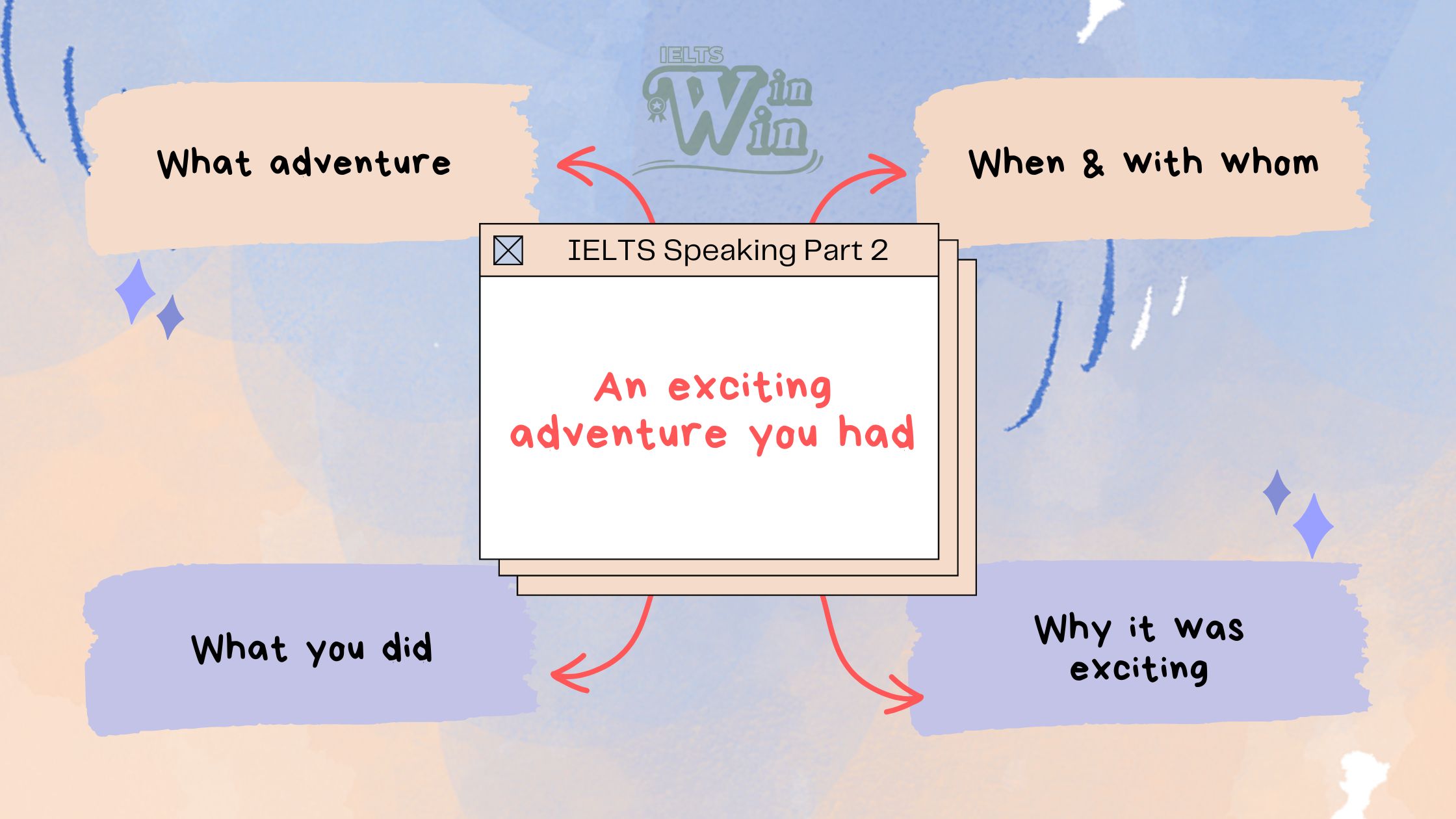✨Part 2: An exciting adventure you had
- What adventure
- When & with whom
- What you did
- Why it was exciting
Well, that's certainly a fascinating question. While I have had numerous thrilling and memorable experiences traveling, one particular trip arises as a notable example.
Recently, I had the opportunity to embark on a 2-day journey in Nha Trang with friends. On the first day, we decided to visit the local beach shores. Upon reaching our destination, we were welcomed by the salty breeze. There, we built sandcastles, splashed in the azure waves, and basked in the sun's warm embrace. For the rest of the day, we visited various landmarks around the city, such as the local marine biology museum, hiking spots, and night markets. Soaking in the city's vibrant atmosphere, indulging in local delicacies, and immersing ourselves in the culture was indeed a delightful and stimulating experience. On the second day, we readied ourselves to travel back home. Since it was our first vacation together, adrenaline coursed through our veins as we tried thrilling activities together, whether hiking breathtaking trails or diving into crystal-clear waters. Even the dullest activities were now exhilarating moments and memories filled with joy and camaraderie.
Through and through, the trip was a perfect blend of adventure, relaxation, and connection. As we bid our farewells, our hearts were filled with excitement, looking forward to the next trip. This trip with friends will forever be etched in our hearts as a time of pure joy and treasured moments.
- fascinating: /ˈfæsəneɪtɪŋ/ (adj) - hấp dẫn, lôi cuốn, thú vị
- thrilling: /ˈθrɪlɪŋ/ (adj) - ly kỳ, hồi hộp, đầy cảm xúc
- memorable: /ˈmemərəbl/ (adj) - đáng nhớ, đáng ghi nhớ, khó quên
- arises: /əˈraɪzɪz/ (v) - nảy ra, xuất hiện, phát sinh
- journey: /ˈdʒɜːrni/ (n) - hành trình, chuyến đi, cuộc hành trình
- shores: /ʃɔːrz/ (n) - bờ biển, bờ, ven biển
- destination: /ˌdestɪˈneɪʃn/ (n) - điểm đến, địa điểm, nơi đến
- sandcastles: /ˈsændˌkæsəlz/ (n) - lâu đài cát, tòa lâu đài cát
- splashed: /splæʃt/ (v) - rực rỡ, rực rỡ lên, văng tầm vóc
- azure: /ˈæʒər/ (adj) - màu xanh ngọc, xanh da trời
- atmosphere: /ˈætməsfɪr/ (n) - bầu không khí, không khí, không khí xung quanh
- delicacies: /ˈdelɪkəsiz/ (n) - đặc sản, thức ăn ngon, đồ ăn ngon
- breathtaking: /ˈbreθˌteɪkɪŋ/ (adj) - ngoạn mục, hấp dẫn, tuyệt vời
- crystal-clear: /ˌkrɪstlˈklɪr/ (adj) - trong suốt như pha lê, trong suốt, trong veo
- exhilarating: /ɪɡˈzɪləreɪtɪŋ/ (adj) - hào hứng, sôi động, kích thích
- blend: /blend/ (v) - pha trộn, hòa trộn, kết hợp
- relaxation: /ˌriːlækˈseɪʃn/ (n) - sự thư giãn, sự nghỉ ngơi, sự giải trí
- farewells: /ˈfeərwelz/ (n) - lời chào tạm biệt, lời tạm biệt, sự chia tay
- excitement: /ɪkˈsaɪtmənt/ (n) - sự hào hứng, sự kích động, sự vui mừng
- etched: /ɛtʃt/ (adj) - khắc, khắc sâu, ăn sâu vào
- pure: /pjʊr/ (adj) - tinh khiết, trong sạch, thuần khiết
- treasured: /ˈtreʒərd/ (adj) - quý giá, được trân trọng, được giữ gìn
Part 3
✨What kinds of adventures do young people in Vietnam enjoy?
As far as I'm concerned, young people in Vietnam enjoy a wide range of adventures. Outdoor activities such as hiking, camping, and exploring nature are popular among them. Additionally, water-based adventures like swimming, kayaking, and snorkeling attract those seeking exhilarating experiences. Adventure sports such as rock climbing, zip-lining, and bungee jumping are also gaining popularity, particularly among thrill-seekers. Furthermore, cultural adventures, such as visiting historical sites, participating in local festivals, and immersing themselves in different traditions, provide young people with unique and enriching experiences.
- concerned: /kənˈsɜrnd/ (adj) - quan tâm, bận tâm, lo lắng
- adventures: /ədˈvɛntʃərz/ (n) - cuộc phiêu lưu, chuyến phiêu lưu, những trải nghiệm thú vị
- Additionally: /əˈdɪʃənli/ (adv) - hơn nữa, thêm vào đó, ngoài ra
- snorkeling: /ˈsnɔːrkəlɪŋ/ (n) - lặn có ống thở, lặn ngắm san hô và động vật biển
- exhilarating: /ɪɡˈzɪləreɪtɪŋ/ (adj) - hào hứng, sôi động, kích thích
- zip-lining: /ˈzɪplɑɪnɪŋ/ (n) - môn thể thao phiêu lưu trên dây cáp treo
- bungee: /ˈbʌndʒi/ (n) - môn thể thao phiêu lưu nhảy dây bungee
- particularly: /pərˈtɪkjələrli/ (adv) - đặc biệt, nhất là, đặc biệt là
- thrill-seekers: /θrɪl ˈsikərz/ (n) - những người tìm kiếm cảm giác mạnh
- historical: /hɪˈstɔːrɪkəl/ (adj) - lịch sử, thuộc lịch sử, có liên quan đến lịch sử
- immersing: /ɪˈmɜːrsɪŋ/ (v) - đắm mình, đắm chìm, chìm đắm
- enriching: /ɪnˈrɪtʃɪŋ/ (adj) - làm giàu, làm phong phú, tăng thêm giá trị.
✨Why do some people like adventures?
There are several reasons why some individuals enjoy adventures. Firstly, adventures offer a break from the routine and allow people to step out of their comfort zones, providing a sense of excitement and novelty. Adventures provide an opportunity to challenge oneself, overcome fears, and develop resilience and confidence. Engaging in adventurous activities also enables individuals to appreciate the beauty of nature, explore new environments, and create lasting memories. Moreover, adventures often foster personal growth, self-discovery, and a sense of accomplishment, making them appealing to those seeking personal development and transformative experiences.
- reasons: /ˈriːzənz/ (n) - lý do, nguyên nhân, cớ
- routine: /ruːˈtiːn/ (n) - thói quen, lịch trình hàng ngày, công việc thường ngày
- provide: /prəˈvaɪd/ (v) - cung cấp, đưa ra, cho
- opportunity: /ˌɑːpərˈtuːnəti/ (n) - cơ hội, thời cơ, điều kiện thuận lợi
- confidence: /ˈkɑːnfədəns/ (n) - sự tự tin, lòng tin tưởng, lòng tin
- adventurous: /ədˈventʃərəs/ (adj) - phiêu lưu, thích phiêu lưu, mạo hiểm
- foster: /ˈfɑːstər/ (v) - nuôi dưỡng, bồi dưỡng, phát triển
- self-discovery: /self dɪˈskʌvəri/ (n) - khám phá bản thân, tìm hiểu về chính mình, sự tự khám phá
- accomplishment: /əˈkʌmplɪʃmənt/ (n) - thành tựu, thành quả, kết quả đã đạt được
- transformative: /trænsˈfɔːrmətɪv/ (adj) - mang tính chất thay đổi, gây ra sự biến đổi, có tính chất cải tổ.
✨What kinds of people are willing to take risks?
People who are willing to take risks often possess certain characteristics. They tend to be adventurous, open-minded, embracing new experiences and challenges. These people have a high tolerance for uncertainty and are comfortable stepping outside their comfort zones. Individuals who are self-motivated, ambitious, and driven by personal growth are more likely to take risks in pursuit of their goals. Additionally, those with a positive mindset, resilience, and a belief in their abilities are more inclined to take calculated risks in various aspects of life, including adventures.
- Characteristics: /ˌkærəktərˈɪstɪks/ (n) - đặc điểm, thuộc tính, nét tiêu biểu
- Open-minded: /ˌoʊpənˈmaɪndɪd/ (adj) - cởi mở, cảm thông, không định kiến
- Challenges: /ˈtʃæləndʒɪz/ (n) - thử thách, khó khăn, trở ngại
- Uncertainty: /ʌnˈsɜːrtnti/ (n) - sự không chắc chắn, sự mơ hồ, sự bất định
- Ambitious: /æmˈbɪʃəs/ (adj) - có hoài bão, đầy tham vọng, có chí khí
- Pursuit: /pərˈsuːt/ (n) - sự theo đuổi, sự truy đuổi, sự săn đuổi
- Mindset: /ˈmaɪndset/ (n) - tư duy, quan điểm, cách nhìn nhận
- Resilience: /rɪˈzɪljəns/ (n) - sự kiên cường, sức chịu đựng, tính đàn hồi
- Belief: /bɪˈliːf/ (n) - niềm tin, tín ngưỡng, đức tin
- Inclined: /ɪnˈklaɪnd/ (adj) - có xu hướng, có khuynh hướng, có chiều hướng
- Calculated: /ˈkælkjuleɪtɪd/ (adj) - đã tính toán, cân nhắc, suy tính
✨Why do some people dislike adventures?
While adventures have their appeal, some individuals may dislike them for various reasons. One possible factor is a fear of the unknown or a fear of taking risks. People who prioritize safety and security may hesitate to engage in adventurous activities due to concerns about personal safety or potential accidents. Additionally, some individuals may prefer activities that align with their personal interests or hobbies, finding more enjoyment in pursuits that do not involve physical challenges or potential discomfort. Lastly, personal preferences, cultural background, and past experiences can shape individuals' attitudes toward adventures, leading some to have a general dislike or disinterest in such activities.
- appeal: /əˈpiːl/ (n) - sức hấp dẫn, sự lôi cuốn, sự thu hút
- prioritize: /praɪˈɔːrətaɪz/ (v) - ưu tiên, xếp hạng, đặt lên hàng đầu
- adventurous: /ədˈventʃərəs/ (adj) - phiêu lưu, thích phiêu lưu, mạo hiểm
- individuals: /ˌɪndəˈvɪdʒuəlz/ (n) - cá nhân, người đơn độc, người cá nhân
- finding: /ˈfaɪndɪŋ/ (n) - kết quả, phát hiện, sự tìm thấy
- potential: /pəˈtenʃl/ (n) - tiềm năng, triển vọng, khả năng
- cultural: /ˈkʌltʃərəl/ (adj) - văn hóa, thuộc văn hóa, có tính chất văn hóa
- attitudes: /ˈætɪtuːdz/ (n) - thái độ, quan điểm, tư thế
✨Do you think people now like adventures more than they did in the past?
To the best of my knowledge, it is reasonable to assume that people today have a greater interest in adventures compared to the past. The modern world offers increased accessibility and exposure to a variety of adventurous activities through the internet, social media, and travel opportunities. The desire for unique experiences, personal growth, and the pursuit of memorable moments has become more prevalent in contemporary society. Aside from that, the growing emphasis on work-life balance and the search for meaningful experiences have contributed to an increased appreciation for adventures among individuals, especially the younger generation.
- compared: /kəmˈperd/ (v) - so sánh, đối chiếu, cân nhắc
- accessibility: /əkˌsesəˈbɪləti/ (n) - tính truy cập, sự tiếp cận, khả năng tiếp cận
- adventurous: /ədˈventʃərəs/ (adj) - phiêu lưu, thích phiêu lưu, mạo hiểm
- growth: /ɡroʊθ/ (n) - sự tăng trưởng, sự phát triển, sự sinh trưởng
- pursuit: /pərˈsuːt/ (n) - sự theo đuổi, sự truy đuổi, sự tìm kiếm
- prevalent: /ˈprevələnt/ (adj) - phổ biến, thịnh hành, có ảnh hưởng lớn
- contemporary: /kənˈtempəreri/ (adj) - đương đại, hiện đại, thuộc thời đại hiện tại
- emphasis: /ˈemfəsɪs/ (n) - sự nhấn mạnh, sự tôn trọng, sự chú ý đến
- generation: /ˌdʒenəˈreɪʃən/ (n) - thế hệ, đời
✨What should parents do to encourage their children to go on adventures?
To encourage their children to go on adventures, parents can take several steps. Firstly, they can lead by example and actively engage in adventurous activities themselves, demonstrating the enjoyment and benefits of such experiences. Parents can also expose their children to nature, cultural events, and outdoor activities from an early age, fostering a sense of curiosity and exploration. Encouraging participation in school programs, summer camps, or organized group activities can provide a supportive environment for adventure. Those are just a few ways to inspire the young for new adventures.
- Encourage: /ɪnˈkɜːrɪdʒ/ (v) - khuyến khích, động viên, cổ vũ
- Actively: /ˈæktɪvli/ (adv) - tích cực, chủ động, năng động
- Demonstrating: /ˈdɛmənstreɪtɪŋ/ (v) - chứng tỏ, bày tỏ, thể hiện
- Fostering: /ˈfɑːstərɪŋ/ (v) - nuôi dưỡng, thúc đẩy, giúp đỡ
- Exploration: /ˌɛkspləˈreɪʃən/ (n) - khám phá, thăm dò, tìm hiểu
- Participation: /pɑːrtɪsɪˈpeɪʃən/ (n) - sự tham gia, sự tham dự, sự cộng tác
- Organized: /ˈɔːrɡənaɪzd/ (adj) - có trật tự, có tổ chức, được sắp xếp
- Supportive: /səˈpɔːrtɪv/ (adj) - ủng hộ, hỗ trợ, đồng hành
- Inspire: /ɪnˈspaɪər/ (v) - truyền cảm hứng, truyền động lực, khơi gợi
Xem thêm các bài viết về Speaking Part 2 và 3 ở đây bạn nhé
Đừng ngần ngại để lại thông tin hoặc liên hệ với chúng mình qua địa chỉ sau đây để IELTS WinWin có thể hỗ trợ tốt nhất cho bạn nhé!
Địa chỉ: 118 Nguyễn Xuân Khoát, P. Tân Thành, Q. Tân Phú, TP. Hồ Chí Minh.
Fanpage: IELTS WinWin
Zalo: 0965 439 239 – 085 301 8788
Website: ieltswinwin.com



